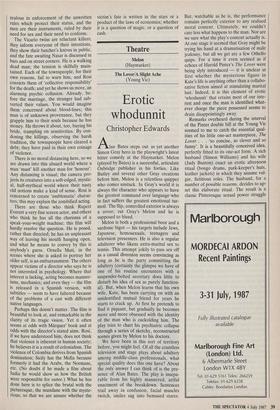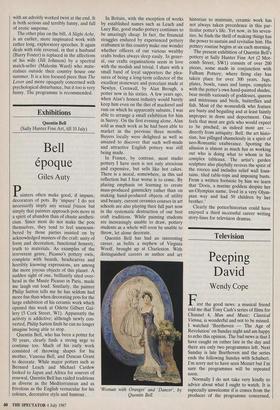Theatre
Melon (Haymarket) The Lover/A Slight Ache (Young Vic)
Erotic whodunnit
Christopher Edwards
Alan Bates steps out as yet another Simon Gray hero in the playwright's latest bitter comedy at the Haymarket. Melon (played by Bates) is a successful, articulate Oxbridge publisher in his forties. Like Butley and several other Gray creations before him, Melon is a relentless quipper who comes unstuck. In Gray's world it is always the character who appears to have the greatest command over language-who in fact suffers the greatest emotional tur- moil. The flip, controlled exterior is always a cover; cut Gray's Melon and he is supposed to bleed.
Melon is both a professional boor and a sardonic bigot — his targets include Jews, Japanese, homosexuals, teenagers and television presenters. He is also a regular adulterer who likens extra-marital sex to tennis. This attempt jokily to pass sex off as a casual diversion seems convincing as long as he is the party committing the adultery (certainly the glimpse we have of one of his routine encounters with a suspender-belted secretary does little to disturb his idea of sex as purely function- al). But, when Melon learns that his own wife, Kate, has been carrying on with an unidentified mutual friend for years he starts to crack up. At first he pretends to find it piquant, but gradually he becomes more and more obsessed with the identity of the man who is cuckolding' him. The play tries to chart his psychiatric collapse through a series of sketchy, reconstructed scenes given by Melon to his doctors.
We have been in this sort of territory before, you might feel. Of all the countless television and stage plays about adultery among middle-class professionals, what special quality does this one have? About the only answer I can think of is the pre- sence of Alan Bates. The play is insepa- rable from his highly mannered, artful enactment of the breakdown. Sentences trail away in confusion, facial muscles twitch, smiles sag into bemused stares. But, watchable as he is, the performance remains perfectly exterior to any realised moral content. Ultimately, we couldn't care less what happens to the man. Nor are we sure what the play's content actually is. At one stage it seemed that Gray might be trying his hand at a dramatisation of male jealousy, but all we get are a few Othello quips. For a time it even seemed as if echoes of Harold Pinter's The Lover were being slyly introduced — it is unclear at first whether the mysterious figure in Kate's life is anything other than a collabo- rative fiction aimed at stimulating marital lust. Indeed, it is this element of erotic `whodunnit' that retains most of our inte- rest and once the man is identified what- ever charge the piece possessed seems to drain disappointingly away. Remarks overheard during the interval of the Pinter double bill at the Young Vic seemed to me to catch the essential qual- ities of his little one-act masterpiece, The Lover . . 'so concise, so clever and so funny'. It is a beautifully conceived idea, perfectly fitted to its one-act form. A rich husband (Simon Williams) and his wife (Judy Buxton) enact an erotic afternoon ritual (bongo drums, park-keeper's huts, leather jackets) in which they assume vul- gar, fictitious roles. The husband, for a number of possible reasons, decides to up- set this elaborate ritual. The result is a classic Pinteresque sexual power struggle with an adroitly worked twist at the end. It is both serious and terribly funny, and full of erotic suspense.
The other play on the bill, A Slight Ache, is an earlier, more inspissated work with rather long, exploratory speeches. It again deals with role reversal, in that a husband (Barry Foster) is replaced in the affections of his wife (Jill Johnson) by a spectral match-seller (Malcolm Ward) who mate- rialises outside their country house one summer. It is a less focused piece than The Lover and more opaquely concerned with psychological disturbance, but it too is very funny. The programme is recommended.



















































 Previous page
Previous page